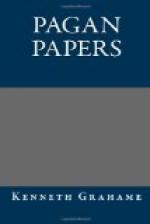regret; though Emerson for one will not have it so,
and maintains and justifies its right to immediate
recognition as poetic material. ``For as it is dislocation
and detachment from the life of God that makes things
ugly, the poet, who re-attaches things to Nature and
the whole — re-attaching even artificial
things and violations of Nature to Nature by a deeper
insight — disposes very easily of the most
disagreeable facts’’; so that he looks
upon ``the factory village and the railway’’
and ``sees them fall within the great Order not less
than the bee-hive or the spider’s geometrical
web.’’ The poet, however, seems hard to
convince hereof. Emerson will have it that ``Nature
loves the gliding train of cars’’; ``instead
of which’’ the poet still goes about the
country singing purling brooks. Painters have
been more flexible and liberal. Turner saw and
did his best to seize the spirit of the thing, its
kinship with the elements, and to blend furnace-glare
and rush of iron with the storm-shower, the wind and
the thwart-flashing sun-rays, and to make the whole
a single expression of irresoluble force. And
even in a certain work by another and a very different
painter — though I willingly acquit Mr
Frith of any deliberate romantic intention —
you shall find the element of romance in the vestiges
of the old order still lingering in the first transition
period: the coach-shaped railway carriages with
luggage piled and corded on top, the red-coated guard,
the little engine tethered well ahead as if between
traces. To those bred within sight of the sea,
steamers will always partake in somewhat of the ``beauty
and mystery of the ships’’; above all,
if their happy childhood have lain among the gleaming
lochs and sinuous firths of the Western Highlands,
where, twice a week maybe, the strange visitant crept
by headland and bay, a piece of the busy, mysterious
outer world. For myself, I probably stand alone
in owning to a sentimental weakness for the night-piercing
whistle — judiciously remote, as some men
love the skirl of the pipes. In the days when
streets were less wearily familiar than now, or ever
the golden cord was quite loosed that led back to
relinquished fields and wider skies, I have lain awake
on stifling summer nights, thinking of luckier friends
by moor and stream, and listening for the whistles
from certain railway stations, veritable ``horns of
Elf-land, faintly blowing.’’ Then, a ghostly
passenger, I have taken my seat in a phantom train,
and sped up, up, through the map, rehearsing the journey
bit by bit: through the furnace-lit Midlands,
and on till the grey glimmer of dawn showed stone
walls in place of hedges, and masses looming up on
either side; till the bright sun shone upon brown
leaping streams and purple heather, and the clear,
sharp northern air streamed in through the windows.
Return, indeed, was bitter; Endymion-like, ``my first
touch of the earth went nigh to kill’’:
but it was only to hurry northwards again on the wings




